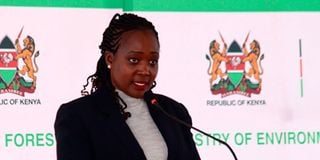Premium
Group wants indigenous peoples’ issues made part of Africa Climate Summit

Environment, Climate Change and Forestry Cabinet Secretary Soipan Tuya addresses participants during the launch of the ministry’s five-year strategic plan in Nairobi on July 27.
As preparation for the African Climate Summit that will take place from September 4-6 in Nairobi enters the home stretch, a lobby has called for the inclusion of indigenous communities in the summit.
The African Region Indigenous People (Arip) argues that the summit’s focus has significant implications for indigenous peoples livelihoods and wants to play a role in the forum whose theme is “Driving Green Growth and Climate Finance Solutions for Africa and the World” ahead of the COP28 climate talks in December.
Arip termed the summit as a “closed” shop despite the group raising their concerns to the summit conveners.
In the agenda proposals seen by Nation, indigenous peoples, including pastoralist communities, want particular attention paid to their concerns, priorities, and potential contribution across the seven pillars of the summit.
On renewable energy and energy transition, for instance, they claim that African indigenous peoples bear most of the environmental and other costs of renewable energy investments (solar, wind, geothermal), which are implemented in their lands and territories.
They want the summit to ensure that the design of renewable energy investments provides for commensurate benefits to, and protection of, their livelihood opportunities and human rights.
“Renewable energy investments should not undermine pastoralist communities' access to rangelands and livestock mobility. Furthermore, the summit should take into account the role of rangelands as carbon sinks and protect them from conversion to inappropriate land uses,”Arip proposes.
Arip also wants the concerns and priorities of indigenous groups incorporated in the design of carbon markets. Among the Maasai, for instance, the carbon credits trade has been booming in recent months targeting community lands before the County Government of Kajiado suspended the trade after revocations of all agreements.
On sustainable agriculture, land, and water, they want the summit to stipulate that indigenous peoples’ free, prior and informed consent shall be obtained for all investments undertaken in their lands and territories.
They are also calling for equitable sharing of benefits accruing from such investments.
On climate finance and carbon credits, Arip is demanding reforms in global financial systems and institutions to ensure that the investments in indigenous peoples’ territories protect their livelihoods and human rights and the sustainability of the environment and natural resources and that they share equitably in the benefits accruing from such investments.
In particular, Arip calls for the design of adaptation finance for Africa to include targeted funding for indigenous people, their lands and territories. To this end, they want to be actively involved in the design of innovative financing and investment models.
They also call for specific protection of their land and resource tenure rights in the design and implementation of Mitigation Finance for Africa; and for due consideration of their historical grievances in discussions on Loss & Damage Finance.
On green minerals and manufacturing Arip calls on the Summit to ensure that investments in green minerals and manufacturing do not undermine their lives, livelihoods and human rights, or their rights to their lands and territories.
They call on the Summit to require that such investments be designed with due regard to ensuring that their continued access to land and natural resources is respected, protected and secured and that their free, prior and informed consent is obtained for such investments in their lands and territories.
Arip argues under the Sustainable Infrastructure & Urbanisation pillar that Indigenous Peoples' lands and territories are under increasing pressure from infrastructure development and urbanisation, particularly as evidenced by the impact of agricultural and development corridors on the mobility of livestock.
Regional infrastructure, including roads, railways, ports and airports that cut through Indigenous peoples' lands and territories, offer new opportunities for investment, employment and economic development, but also have significant negative impacts on traditional livelihoods.
Indigenous Peoples call on the Summit to state that securing the livelihoods of Indigenous Peoples is central to the sustainability of infrastructure development and urbanisation and that this can only be achieved through the effective participation of Indigenous Peoples in the design of such development, within the framework of Free, Prior and Informed Consent.





